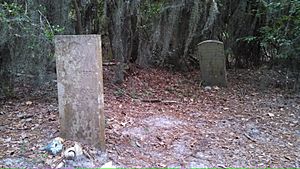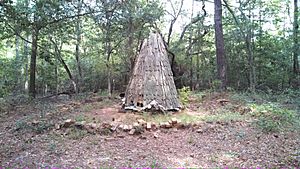Wash Woods, Virginia facts for kids
Wash Woods was once a small, unofficial town located right on the Atlantic Ocean coast in what is now Virginia Beach, Virginia. It became a ghost town in the 1930s, meaning everyone moved away. Only a special station that helped rescue sailors stayed open until the mid-1950s. Today, you can find the old town site inside False Cape State Park.
According to old stories, the first people to live in Wash Woods were survivors of a shipwreck. They swam to this remote beach many centuries ago and decided to make it their home. The town's church and other buildings were made from cypress wood. This wood washed ashore from a schooner called the John S. Wood. The ship broke apart during a storm in 1889 while carrying a load of lumber.
By the early 1900s, Wash Woods was a busy place. It had two stations for rescuing ships, a grocery store, two churches, and a school. About 300 people lived there. They worked as fishermen, farmers, and guides for hunters. Some were also "lifesavers," patrolling the beach and using lifeboats to rescue sailors in trouble.
Contents
A Town on the Dangerous Coast
Wash Woods was located on a part of the US East Coast known as the Graveyard of the Atlantic. This area often had very bad weather. The same storms that caused shipwrecks and brought lumber to the town also made life hard for its residents.
Early Rescue Efforts
One of the first Life-Saving Stations was built here in 1875. It was called False Cape. After two terrible shipwrecks, the USS Huron and the steamship Metropolis, many people died. This led the government to build another station nearby in 1877. It was first called Deal's Island Station. Around 1883, it was renamed Wash Woods, after the town. In 1917, a new, more modern US Coast Guard station replaced the old one.
Why Wash Woods Became a Ghost Town
The sea often flooded the narrow strip of land where Wash Woods stood. Because of this, people started leaving the town in the 1920s. Another reason was a law passed in 1918 called the Migratory Bird Treaty Act. This law made it illegal to hunt waterfowl (like ducks and geese) to sell them. Many people in Wash Woods made money by hunting, so this law affected their jobs.
The Big Storms of 1933
The final blow came in 1933. Two very strong hurricanes hit the area one after another. These were the 1933 Chesapeake–Potomac hurricane and the 1933 Outer Banks hurricane. The huge storm surges from these hurricanes flooded the entire area. Many buildings, including the Coast Guard Station, were damaged. Most of the good soil from the farms was washed away into Back Bay.
After these storms, the few people still living in Wash Woods moved away. They went to Knotts Island or other parts of Princess Anne County. The land then became home to several hunting clubs for waterfowl.
Wash Woods Today
Today, the area where Wash Woods once stood is part of False Cape State Park in Virginia. It is next to the Back Bay National Wildlife Refuge, which is managed by the government.
Remaining Structures
You can still find a small cemetery next to the ruins of the Wash Woods Methodist church. Sadly, the church's steeple was torn down by vandals around 1980.
The Wash Woods Coast Guard station, built in 1917, is still standing a few miles south of the old town site. It's now across the state line in Carova Beach. This old Coast Guard Station was fully repaired in 1989 and is now used as an office for real estate.
A Unique Voting Place
Even in the mid-1950s, Wash Woods was still a voting area with only 13 registered voters. On election days, all 13 voters would often meet just after midnight to cast their votes. Back then, Virginia law allowed a voting area to close and report results as soon as everyone had voted in person. Since all 13 voters usually voted for the same political party, the results from Wash Woods were reported very early. This was used to encourage people to vote for that party.
Later, in the mid-1960s, a few new voters registered in Wash Woods and voted by mail. Because of this, the voting area could no longer close right after midnight. This meant it lost its special early reporting advantage. Soon after, local officials closed the Wash Woods voting area and moved its voters to a larger one nearby.
 | Jackie Robinson |
 | Jack Johnson |
 | Althea Gibson |
 | Arthur Ashe |
 | Muhammad Ali |



